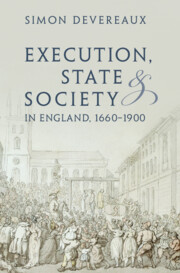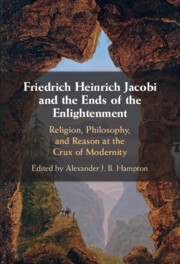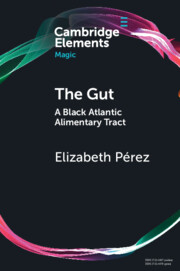26 results
3 - Changing Cultures of Execution: Religion and Feeling, 1660–1770
-
- Book:
- Execution, State and Society in England, 1660–1900
- Published online:
- 12 October 2023
- Print publication:
- 26 October 2023, pp 63-93
-
- Chapter
- Export citation
10 - Conclusion
-
- Book:
- Execution, State and Society in England, 1660–1900
- Published online:
- 12 October 2023
- Print publication:
- 26 October 2023, pp 367-378
-
- Chapter
- Export citation
5 - The Murder Act: Anatomization, 1752–1832
-
- Book:
- Execution, State and Society in England, 1660–1900
- Published online:
- 12 October 2023
- Print publication:
- 26 October 2023, pp 141-196
-
- Chapter
- Export citation

Execution, State and Society in England, 1660–1900
-
- Published online:
- 12 October 2023
- Print publication:
- 26 October 2023
15 - Jacobi as Literary Author
- from Part IV - Jacobi’s Impact on Idealism and Romanticism
-
-
- Book:
- Friedrich Heinrich Jacobi and the Ends of the Enlightenment
- Published online:
- 09 February 2023
- Print publication:
- 16 February 2023, pp 286-301
-
- Chapter
- Export citation

Friedrich Heinrich Jacobi and the Ends of the Enlightenment
- Religion, Philosophy, and Reason at the Crux of Modernity
-
- Published online:
- 09 February 2023
- Print publication:
- 16 February 2023
Intuitive decisions on the fringes of consciousness: Are they conscious and does it matter?
-
- Journal:
- Judgment and Decision Making / Volume 3 / Issue 1 / January 2008
- Published online by Cambridge University Press:
- 01 January 2023, pp. 28-41
-
- Article
-
- You have access
- Open access
- HTML
- Export citation

The Gut
- A Black Atlantic Alimentary Tract
-
- Published online:
- 06 December 2022
- Print publication:
- 05 January 2023
-
- Element
- Export citation
Karl Heinrich Heydenreich, “On Moral Freedom,” in Betrachtungen über die Philosophie der natürlichen Religion, Volume ii, Leipzig, 1791, 56–69
- from III - Freedom and Consciousness
-
- Book:
- Kant's Early Critics on Freedom of the Will
- Published online:
- 24 March 2022
- Print publication:
- 31 March 2022, pp 127-134
-
- Chapter
- Export citation
Sages, Sympathy, and Suffering in Kant’s Theory of Friendship
-
- Journal:
- Canadian Journal of Philosophy / Volume 51 / Issue 6 / August 2021
- Published online by Cambridge University Press:
- 10 March 2022, pp. 452-467
-
- Article
- Export citation
Introduction: Reading Poetry
-
- Book:
- The Cambridge Guide to Reading Poetry
- Published online:
- 04 November 2021
- Print publication:
- 18 November 2021, pp 1-18
-
- Chapter
- Export citation
Chapter 1 - Introduction: The Spinoza Connection, or the Discovery of “Feeling”
-
- Book:
- Hegel and the Challenge of Spinoza
- Published online:
- 17 September 2021
- Print publication:
- 30 September 2021, pp 1-24
-
- Chapter
- Export citation

Hegel and the Challenge of Spinoza
- A Study in German Idealism, 1801–1831
-
- Published online:
- 17 September 2021
- Print publication:
- 30 September 2021
Chapter 4 - Emotions and Value
-
- Book:
- Moral Responsibility and the Psychopath
- Published online:
- 27 August 2021
- Print publication:
- 16 September 2021, pp 98-131
-
- Chapter
- Export citation
Feeling, Orientation and Agency in Kant: A Response to Merritt and Eran
-
- Journal:
- Kantian Review / Volume 26 / Issue 3 / September 2021
- Published online by Cambridge University Press:
- 01 July 2021, pp. 379-391
- Print publication:
- September 2021
-
- Article
- Export citation
Chapter 4 - Feeling, Drive, and the Lower Capacity of Desire
-
-
- Book:
- Fichte's System of Ethics
- Published online:
- 20 May 2021
- Print publication:
- 20 May 2021, pp 66-84
-
- Chapter
- Export citation
8 - Sensibility: Passion, Emotion, Affect
-
-
- Book:
- The Cambridge Companion to Eighteenth-Century Thought
- Published online:
- 15 June 2021
- Print publication:
- 20 May 2021, pp 227-247
-
- Chapter
- Export citation
Chapter 6 - Affect’s Vocabularies
- from II - Horizons
-
-
- Book:
- The New Modernist Studies
- Published online:
- 21 January 2021
- Print publication:
- 04 February 2021, pp 129-151
-
- Chapter
- Export citation
4 - Aristotelian Choice
-
- Book:
- Aristotle on Thought and Feeling
- Published online:
- 08 January 2021
- Print publication:
- 07 January 2021, pp 65-80
-
- Chapter
- Export citation
Introduction
-
- Book:
- Aristotle on Thought and Feeling
- Published online:
- 08 January 2021
- Print publication:
- 07 January 2021, pp 1-12
-
- Chapter
- Export citation



